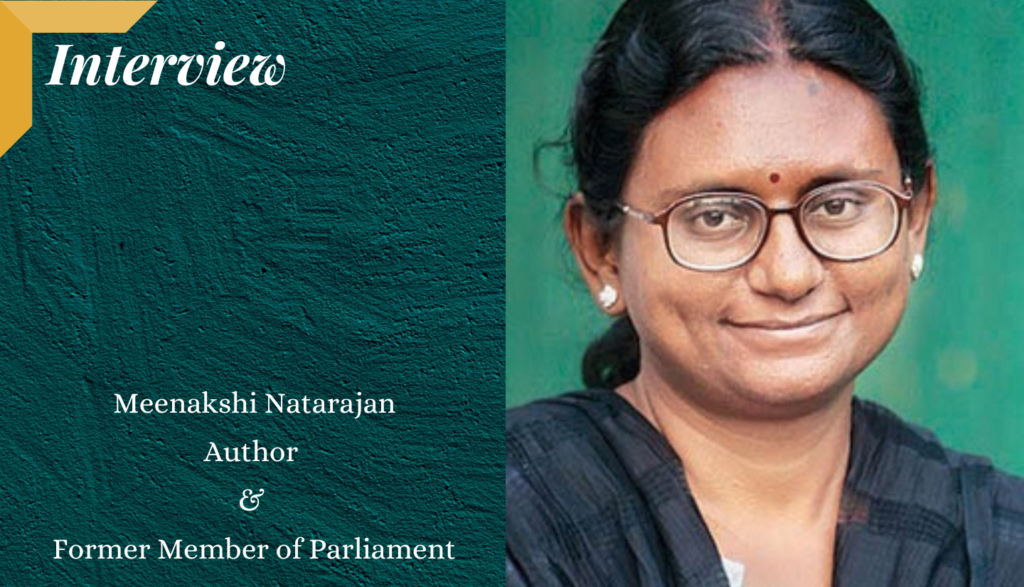
Meenakshi Natarajan is an Indian politician and former Member of Parliament from Mandsaur. She started her political career with NSUI. Later on, she became the President of the youth wing and then the women wing of the Congress Party. She is a postgraduate in Biochemistry and did her bachelor’s degree in Law. She is the author of two books. One is titled “1857 Bhartiya Paripekshay,” and the other is “Apne Apne Kurukshetra.” She writes regularly for Sunday Navjeevan.
Here’s our brief conversation with the politician:
Vandana Bhasin: What was your drive for joining politics, as you are not from a political family?
Meenakshi Natarajan: One of the most important reasons for me was the zeal to change the system. In our youth, we want to change the world as we keep finding fault with everything, and for that, we need to be a part of the system. I wanted to change the political consciousness of the youth, especially women. Change begins with oneself.
Also, politics is a journey of oneself. You try to understand your limitations and learn to deal with them. You learn about things that you never recognized as fears. If you are true to the political world, then politics is a spiritual journey if done rightly. When you meet other people like farmers, masons, carpenters, and butchers, you start seeing yourself and your life through their lens, and that changes everything.
Vandana Bhasin: What is the role of women in Indian politics? Should there be more participation of women in politics to create a balance in the system?
Meenakshi Natarajan: There are two different worldviews about the role of women. One is the Eastern world view which is more feminist, not in the sense of more women than men in the system or women empowerment but in terms of more women-related values like deep values of love, compassion, and forgiveness.
Masculine or patriarchal worldview is different where you talk about control and spreading fear. Whenever we have seen such a system being superimposed, there has been a decline. In historical times, even Ashoka and Akbar transformed themselves, but many others didn’t. Wherever there is hatred, violence, or fear, there is patriarchy but love and compassion come from feminine energies.
This is the original clash of the perspectives in the world. So the fight is between these two systems, and therefore, I feel that in politics, there should be more women to maintain that balance and regain those feminine values and perspectives.
Vandana Bhasin: Ma’am, what would you like to share about the author in you? What prompts you to write? How often do you write?
Meenakshi Natarajan: I write every week, and my article is published every Sunday in the weekly Hindi newspaper Navjeevan. I write a lot about children’s literature, and currently, I am writing a book about the Discovery of India through children’s stories. It would be an interesting resource for children to understand different time periods in the history of India.
Vandana Bhasin: Please tell us about your book “Apne Apne Kurukshetra,” published in Jan 2019, that won an award by Madhya Pradesh Sahitya Sansthan.
Meenakshi Natarajan: It is a novel written in a conversation style. It provides the perspective of various women characters in Mahabharata. It talks about how the war affects the everyday struggles and the struggle within, the dilemma, the insecurities, the struggle to take a stance, and the prejudices that come into play. It covers the entire story of Mahabharata by presenting conversations of Satyavati, Draupadi, Kunti, Amba, Gandhari, and other women with Bhishma. It talks about the Kurukshetra that goes within oneself every day.
Vandana Bhasin: What message would you like to give to women who aspire to create their own identity?
Meenakshi Natarajan: Every woman has the right to live a life that she designs for herself, and she should design life for herself. A woman is certainly a mother, a daughter, and a wife but a man is also a son, a husband, and a father. So these identities should not overshadow her individuality. No matter what happens, her identity should not get compromised.
Vandana Bhasin: Do you feel that communities like ALS help in bringing about a change in society?
Meenakshi Natarajan: Definitely. I am a great supporter of ALS initiatives because lots of women from various backgrounds get a medium for expression, and there aren’t many such platforms that provide such opportunities.

0 Comments